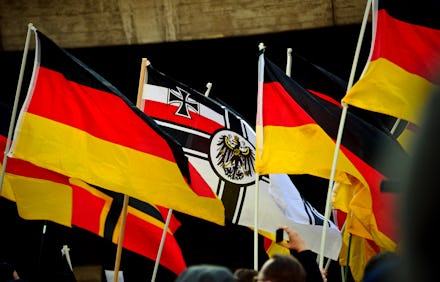Anti-Muslim Protest in Cologne Turns Violent as Germans Condemn Racist Rhetoric

Cologne, Germany, was again the site of violent clashes Saturday, when authorities resorted to water cannons as a means of dispersing anti-Islam protesters, who reportedly fought back with firecrackers and bottles.
Coordinated by members of the xenophobic Pegida movement — Patriotic Europeans Against the Islamisation of the West — Saturday's demonstration of 1,700 people took place at Cologne's main train station; according to Deutsche Welle, "half of those attending the Pegida rally were football hooligans and right-wing extremists." Hundreds of police were dispatched to maintain order as some 1,300 counter-protesters converged on the anti-Muslim rally, where Chancellor Angela Merkel came under fire for her open-door policy on Middle Eastern refugees seeking asylum in Germany.
"Merkel has become a danger to our country," a Pegida protester reportedly told the demonstrators. "Merkel must go!"
The Dresden-based Pegida movement opposes the spread of Islam within Europe; it claims to stand against "hatemongers, regardless of which religion they belong to" and "radicalism, whether religiously or politically motivated." Yet, Merkel herself has condemned the group's racist ideology, saying they have "coldness, prejudice and hatred in their hearts." Pegida has loudly decried the influx of asylum seekers into Germany, and the attacks that swept Cologne's New Year's Eve celebrations have only added fuel to the fire.
Over 500 criminal complaints have been filed by women who report being assaulted by men of "Arab or North African" appearance over the course of the evening. On Thursday, a leaked police report suggested that at least one of the perpetrators was Syrian and claimed to be in the country on Merkel's invitation. As the International Business Times reported, Interior Minister Tobias Plate said Friday that "of the 31 suspects whose names are known, 18 have asylum seeker status."
On Saturday, Merkel announced that parliament would consider a tightening of Germany's immigration policy, which has attracted criticism from within her government and outside. After a meeting with her party, the Christian Democrat Party (CDU), Merkel told the press that parliament would consider amending Germany's current regulations to make the deportation of migrants who have violated Germany's laws easier and more expedient.
"When crimes are committed, and people place themselves outside the law...there must be consequences," she said.
Germany's current asylum law states that refugees can only be deported if they are convicted of a crime and given a prison term of three or more years, and even then, potential deportees will only be sent back to their country of origin if doing so won't put their lives at risk.
Other government figures back the proposal, including Justice Minister Heiko Maas, who believes that the assaults, muggings and rapes that took place before Cologne's cathedral on Dec. 31 may have been planned well before they were executed, and coordinated with events in other cities.
"No one can tell me that it wasn't coordinated and prepared," he said, according to the Deutsche Welle. "My suspicion is that this specific date was picked, and a certain number of people expected. This would again add another dimension [to the crimes]."
Maas was clear, though, that Germans and the world should not take the attacks as an opportunity to practice hate against migrants. "To assume from somebody's origin whether or not they are delinquent is quite reckless," he said, adding that it is "complete nonsense" to claim that immigrants from these countries can't coexist peaceably with Germans, based on the New Year's Eve events in Cologne.
"Cultural background justifies or excuses nothing," Maas explained. "There is no acceptable explanation [for the assaults]. For us, men and women have equal rights in all matters. Everyone who lives here must accept that."
Many Germans agree that the incident shouldn't serve as justification for hate speech: The 1,300 protesters who showed up to oppose Pegida Saturday weren't the only ones who spoke out against the blanket condemnation of migrants. A "flash mob of about 300 people took place right outside Cologne's famous cathedral, with women, men and children calling for an end to racism and violence against women," the Deutsche Welle reported. For the protesters pushing for a halt on racist rhetoric from the right, the ill-will aimed at refugees is entirely misguided.
"When will people understand that this is not about refugees?" one anti-Pegida demonstrator told the Deutsche Welle. "This is about us women, who live under this threat of sexual assault on a daily basis."